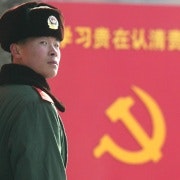Hong Kong's protesters will be tomorrow's leaders
There is one thing that Australian politicians as diverse as Tony Abbott, Julia Gillard, Peter Costello and Lindsay Tanner, among many others, all have in common: they all cut their political teeth on university campuses in the rough and tumble world of student politics. For many of these future leaders, campus political experiences were formative, paving the way for successful careers on the national stage.
Now, the current group of students leading pro-democracy protests in Hong Kong are being forged as future political leaders in similar furnaces.
If it was not clear already, this birth of a new generation of Hong Kong politicians was broadcast through a live televised debate between student leaders and Hong Kong government representatives last week. On one side, we saw five skilled politicians, and on the other side, five bumbling amateurs. No prizes for guessing which side was which.
The five government representatives were all appointed bureaucrats -- public servants, all but one of whom had never faced an election in their lives. (Former pro-Beijing legislator Ray Lau was appointed by Chief Executive CY Leung as under secretary for constitutional and mainland affairs after losing his seat in the 2012 elections). They were wooden and mechanical, putting in a performance that did nothing to ameliorate a public image of a government out of touch with the people.
All of the student leaders on the other hand, had earned their place at the table through student union elections (not unlike those that take place on university campuses across Australia). They spoke with passion, conviction and even humour, leaping upon and lampooning CY Leung's gaffes (they had an embarrassment of riches from which to choose). Most dangerously for the government, they spoke not only to the narrow political and constitutional issues that had previously been their primary agenda (and to which much of the general population is frankly indifferent), but also articulated broader social concerns -- income inequality, housing affordability, the influence of the tycoons on Hong Kong -- concerns which have a direct impact on the lives of ordinary Hong Kongers. To put it in Australian terms, they were speaking directly to the "battlers".
Make no mistake: these kids are politicians. And right now they are working the campaign trail hard. Every single night they take to the main podium at Admiralty to give speeches to the assembled crowds, updating people on the day's events, encouraging protesters to stay the course, and satirising the government's daily gaffes. Every single day they travel around town visiting they key protest sites from Mong Kok to Causeway Bay and back to Admiralty, participating in street side debates, giving impromptu speeches and mixing with the people. In between, they give briefings to packs of local and international media in three languages (Cantonese, English and Mandarin for the benefit of a very interested public in Taiwan). And all the while they are furiously working their smartphones engaging the huge community of young supporters they have built through social networking.
In an op-ed in the New York Times yesterday, Joshua Wong, the 18 year-old founder of the student activist group Scholarism, wrote:
"I would like to remind every member of the ruling class in Hong Kong: Today you are depriving us of our future, but the day will come when we decide your future."
It was an unambiguous - and faintly ominous - message, not just to the current Hong Kong government administration but also to the tycoons that support them and to the authorities in Beijing: We are the leaders of the future.
In this crucible are being formed the next generation of Hong Kong politicians. With an apprenticeship like this, they are giving every indication of being far more experienced, disciplined and effective than the generations that have preceded them. Beijing is on notice.
Antony Dapiran is a Hong Kong-based international lawyer. You can follow his photographs and ongoing commentary on the events in Hong Kong on Twitter @antd.















